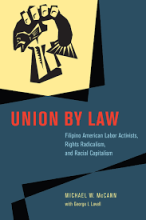By Katie Pattenaude, LSJ Student Communications Assistant
Professor Michael McCann has been heavily involved in union and progressive politics around the Puget Sound ever since he arrived in the region in the mid 1980s. As the founder of Law, Societies & Justice, a Professor of Political Science, and former director of the Harry Bridges Center for Labor Studies, McCann’s expertise lies in rights-based struggles for social justice, with particular focus on challenges to race, gender, and class hierarchies.
In the late 1990s, McCann learned about the story of two young Filipino labor activists, Silme Domingo and Gene Viernes, who were murdered in 1981 for organizing against Filipino dictator Ferdinand Marcos. As McCann began to explore the political and legal histories behind their stories, Union by Law was conceived.
Released in April, Michael McCann and co-author George Lovell’s book, Union by Law: Filipino American Labor Activists, Rights Radicalism, and Racial Capitalism (2020) explores the relationship between law and social change through a 100-year history of Filipino labor activists.
The story begins with the American invasion of the Philippines at the beginning of the twentieth century, through which a colonial government was established and half of a million Filipinos were killed. Filipino farmers were kicked off of their land and recruited to work in American West Coast agricultural fields and Alaska salmon canneries. There, they found themselves subject to low wages, poor working conditions, racially segregated workplaces, and ethnic persecution.
For decades, these Filipino-American workers mobilized against the injustices of the American racial capitalist empire, forming labor unions and using litigation as an organizing tool. Filing class action lawsuits not only facilitated organizing amongst cannery workers, but helped activists seek democracy within the union.
Following a few major victories in 1970s era civil rights cases, Wards Cove Packing Co v. Antonio resulted in a tremendous loss for Filipino-American workers as the Supreme Court ruled against their claim of discrimination in the workplace.
Despite facing loss at the hands of the Supreme Court, Union by Law illustrates how litigation and rights-claiming can be utilized as an effective tool for change.
“[Cannery workers] were speaking the language of human rights well before the 1940s and the International conventions on human rights... they saw in the promise of equal rights possibilities for radical economic redistribution and much thicker conceptions of equality than tend to prevail in American courts and liberal law,” McCann said.
Even in the face of state repression and anti-civil rights rulings, litigation helped to advance organization amongst Filipino-American cannery workers, enabling them to build coalitions with other activists and publicize their efforts.
“We want [the book] to be an inspiration to people,” McCann said. He noted that litigation is just one tactic of many in the fight for social change. Other strategies include grassroots organizing, legislative lobbying, and media tactics.
“It's really a story about aspiration, about imagining a better society and then using legal rights discourse as a resource in doing that,” McCann expressed. “Law is a way to make for a better world.” But, he warned, “Law is also about violence. That violence is particularly directed to low wage, racialized subjects.”
As a spinoff project, McCann is currently working on an article about the history of law in racial capitalist regimes. Specifically, it explores the idea that we have a dual legal system - one for white, property-owning citizens, and another for racialized, low-income and poor people.
“It's really two different kinds of law for two different categories of people,” McCann argued. “There's something quite systematic about it.”
McCann is also working with former graduate students on a book about how the state justifies violence, using the case study of how the British government detained, tortured, and murdered Irish separatists in the 1970s and 80s.
Finally, McCann revealed that he's currently sliding into retirement. “That doesn’t mean I’m going to stop mentoring graduate students or doing research. In fact, I hope to do more labor activism,” he said.
